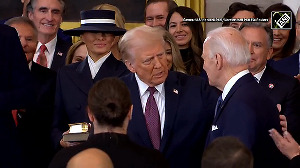New Delhi -- which has had a disastrous neighbourhood policy that has alienated almost all the States with which it has a land or sea border -- seemed to be unwilling over the past years to even consider that its unquestioning support of Sheikh Hasina was painting it into a corner, points out Mihir S Sharma.

With hindsight, there was far too much complacency about deposed Bangladesh prime minister Sheikh Hasina's hold on power.
The apparent disarray of the official Opposition Bangladesh Nationalist Party -- whose leader, Ms Hasina's long-time rival Khaleda Zia, was sentenced to 17 years in jail in 2018, and has been ill for some time -- meant that the Awami League appeared unassailable.
The Bangladesh Jamaat-e-Islami retained many committed activists, but it also seemed to carry too much historical and ideological baggage to be seen as a credible replacement for the BNP as an effective Opposition.
Given the lack of any organised political challenge, it seemed that Ms Hasina would stay in power as long as she willed it.
We now know how untrue that belief was. The unceremonious exit of the world's longest-serving female head of government followed weeks of intensifying protests led by students from Dhaka University; but it also followed serious mis-steps by Ms Hasina's government and party, most especially the attempt to use street violence to confront the protestors.
Too many died in that confrontation for Ms Hasina's government to survive.
Governments, even autocratic ones, are best placed to survive protests if they do not attempt to crush protestors with violence.
If they do, they must be certain that force will be overwhelming and sustained, and completely backed by the military.
In Kyiv a decade ago, during the Maidan Square protests, the breaking point for the Moscow-backed government of Viktor Yanukovych came when over 100 people died in clashes with special riot police.
But Mr Yanukovych could not count on his military to reinforce the paramilitary, and had to flee.
The difference with June 4, 1989, when the People's Liberation Army happily followed order to mow down students in Tiananmen Square, thereby cementing the Communist party in power, is stark.
Ms Hasina had to leave only when she pushed her military too far.
She may have tried to buy them off over the past decade. But that is a double-edged sword. You cannot permanently buy a military's loyalty, merely rent its acquiescence.
The first priority of armies in authoritarian States is always to preserve their position and privileges.
To do that, they will turn on -- or refuse to support -- their benefactors if necessary.
Even in the most terrifying of totalitarian regimes, ultimate power rests with the army.
Armando Ianucci's The Death of Stalin does not pretend to historical accuracy -- but it is certainly true, as depicted in the movie, that Marshal Georgy Zhukov's support was essential to the deposition, after the dictator's death, of the Stalinist clique led by his spymaster Lavrenti Beria.
Bangladesh's tentative steps after Sheikh Hasina, therefore, must be carefully watched to try and understand the degree to which the army feels empowered to impose a successor regime.
In a best-case scenario, the caretaker government under Mohammed Yunus serves as similar regimes did in the 2000s, long enough to recreate 'normal' politics and hold a free and fair election.
Whoever takes over then could have the authority to ensure the army stays in its barracks.
But, even then, they will have to achieve some sort of concord with the military leadership, including the preservation of its business interests.
In Bangladesh, as in Pakistan and in Egypt, leaders desperate to keep middle-level and senior officers on their side have allowed the army to expand their participation in the non-military economy.
This may appear cheap and sensible in the short term as a way of shoring up support.
But, in the long term, it is clearly destabilising, as Sheikh Hasina is only the latest deposed leader to discover.
We all hope the best-case scenario comes about. Certainly, that is what Mr Yunus likely believes he can achieve.
But, objectively, the prognosis for Bangladesh politics is not good.
The army may not be truly desirous of wielding political power, but it can feel it needs to do so in order to defend its interests.
Or it may do so if it fears the alternative is chaos, continuing disorder, or the rise of political Islamism; this is what has happened in Egypt under Abdel Fatteh el-Sisi.
The most complacent actors in this drama have been, unquestionably, in New Delhi and Washington.
New Delhi -- which has had a disastrous neighbourhood policy that has alienated almost all the States with which it has a land or sea border -- seemed to be unwilling over the past years to even consider that its unquestioning support of Sheikh Hasina was painting it into a corner.
As for Washington, it has had an ambassador to Dhaka for the past two years who merely ensured that the Awami League government grew to distrust America without sowing any seeds of responsible governance or respect for liberal values in the Opposition.
Authoritarians and their supporters can never afford to be complacent.
The people may always rise up to remove you -- and succeed if the men with the big guns agree.
Feature Presentation: Aslam Hunani/Rediff.com












 © 2025
© 2025